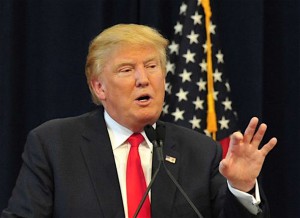
President-elect Donald Trump is rethinking his plans for terminating the North American Free Trade Agreement.
Apparently ripping up NAFTA is not Job One for the incoming Trump administration after all.
The Hill, a newsletter and website that follows policy developments in Washington, reported this week that members of President-elect Donald Trump’s transition team are telling corporate executives that the administration isn’t going to do anything that might prompt a trade war with Mexico or Canada, this country’s principal partners in the North American Free Trade Agreement.
Trump announced he will scuttle the Trans Pacific Partnership. But unlike TPP, which was never signed or approved, NAFTA has been in place for more than 20 years and has created a broad web of interests on both sides of the border. It is considered essential by automakers.
General Motors Co., Ford Motor Co. – a major Trump target during the 2016 campaign for the White House – and Fiat Chrysler Automobiles N.V. all have major production plants in Mexico that ship finished vehicles back across the border to dealers in the U.S. During the past three years, automakers have sunk more than $24 billion in new plants in Mexico and suppliers have followed suit.
Wilbur Ross, the incoming secretary of commerce, is the principal shareholder in IAC, a major maker of automotive components has significant operations in Mexico.
(To see more about Mary Barra new role helping the incoming Trump administration, Click Here.)
Anthony Scaramucci, a senior advisor on the Trump transition team, told a group of business leaders that Trump is a free-trader who is looking to make trade deals more fair, not scrap them, according to The Hill.
“I don’t think we’re looking to rip up NAFTA as much as we are looking to right-size it and make it fairer,” he said. “He’s got a great relationship, by the way, with the Mexican president. They talk regularly,” referring to Trump and Mexican President Enrique Peña Nieto.
Scaramucci said part of his role with Trump’s economic team has been to study NAFTA, which Trump had described during the campaign “the worst trade deal maybe ever signed anywhere.”
“I don’t think anybody in the administration from the top to the bottom is looking for protectionism. We understand the economic harm and the impact that would take,” Scaramucci said.
(Click Here for details about Ford CEO Mark Fields warning about the impact of Trump’s proposed trade policies.)
“I don’t think anybody in the administration is looking for quote-unquote tariffs, but I think they are a cudgel, if you will, to lay out there if we can’t get the trade deals to be right-sided to now benefit the American people.”
Trump also bashed Hillary Clinton during the presidential campaign for her husband’s role in crafting the landmark 1994 trade accord, which he said he would “entirely renegotiate” or “terminate.”
To the delight of many of his supporters, Trump has taken to shaming big public companies such Ford, United Technologies and its Carrier unit, and even Boeing, which he accused of gouging the government on the contract to build the next version of Air Force One.
Ford has repeatedly denied Trump’s claims that the company gave into his pressure and moved jobs back from Mexico to Ohio and Kentucky. But Carrier did agree to a deal that kept about 1,000 jobs in Indiana.
(To see what auto industry issues will be high on the next President’s agenda, Click Here.)
Scaramucci said trade officials in the past have failed to use the “regulatory process or the review process” created under NAFTA to ensure fair compliance. “Things get snippeted a certain way in the media and they get framed a certain way that he’s a protectionist and he’s against trade. I can state categorically that if he were standing here right now, he’d tell you that he’s a free trader,” he said.

Not 1000 jobs in Indiana. Maybe 700 at best as not all those jobs were going to move anyway.
Ripping up NAFTA was NEVER Job 1 for Trump – building the wall or dismantling ObumbleCare WAS Job 1.
Looks like another campaign promise dissolves.
Did he create the deal with Carrier or did Pence home state legislature create the deal with Carrier?
He did NOT create the deal. It was an Indiana deal in the works for some time. And it keeps only a fraction of the actual carrier jobs. About 1,500 still leave.